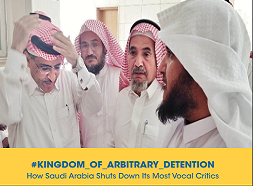Egypt: Arbitrary Executions of Civilians in North Sinai
On 23 February 2015, Alkarama solicited the United Nations Special Rapporteur on Extrajudicial, Summary or Arbitrary Executions (SUMX) to ask the Egyptian authorities to launch investigations into the arbitrary executions of two men killed during military operations in North Sinai. 71-year-old, Eid Said Salama Al Hamadine and 50-year-old, Hilmi Sayed (whose name was anonymised) were killed respectively on 17 August 2014 and 5 January 2015 in Sheikh Zuweid, a Bedouin town in the North Sinai Governorate, near the Rafah border crossing with the Gaza Strip.
Since the 2011 Egyptian revolution, the region of the North Sinai has been the scene of violent clashes between armed groups and the security apparatus. The rampant poverty and the government's ignorance of the social reality on the ground have exacerbated the population's resentment towards the army, and attacks have escalated after the July 2013 military coup. In response, the army has carried out several military manoeuvres as part of the "Operation Sinai" launched in August 2012 to crush the Sinai insurgency.
It is in this context that, on 17 August 2014, military officers from the military camp of al-Zuhur, in the neighbourhood of Sheikh Zuweid, entered the Bedouin town and started to forcibly evacuate its inhabitants. During this operation, Al Hamadine was arrested in the streets and brought to his home where he was reportedly shot dead by soldiers, who left his corpse in there before demolishing his house. His neighbours had to search for him in the rubbles to confirm his execution by the army.
In October 2014, the Egyptian military was struck by a particularly violent attack that killed at least 33 security personnel. As a consequence, the government declared a three-month state of emergency, and established a curfew in the region. In a move to protect its North Sinai borders and to keep attackers and weapons out, the Egyptian regime also accelerated its plans to create a 500-meter deep buffer zone right along its 14km border with the Gaza strip – a zone that includes the Sheikh Zuweid area – giving the area's 10,000 residents 48 hours to pack up and leave before they started to destroy their hundreds of homes.
Decided without prior consultation with the local populations, and without offering clear compensation or relocation measures, these policies are in total violation of both the 2014 Egyptian Constitution (Article 63) and international human rights law.
Furthermore, arbitrary executions continue to be perpetrated with complete impunity, as illustrated by the case of Hilmi Sayed, arrested from his home by the army on 2 January 2015 and forcibly taken to the 101 Battalion camp where he remained secretly detained until his corpse was found by relatives on 5 January 2015, in the desert near the camp, with bullets in the chest.
In their customary fashion, the authorities provided no reason for the arrests and executions of Al Hamadine and Sayed and did not open any investigations to prosecute their perpetrators; nor did the families to refer to the judiciary, as it is well-known that the public prosecution does not want to interfere in military operations.
Left with no recourse at the local or national level, the families of the victims contacted Alkarama, who subsequently called upon the UN Special Rapporteur on SUMX to ask the authorities to impartially and independently investigate these deaths and ensure justice to their families.
Alkarama recalls that the right to life is a non-derogable right, and that even under special circumstances, such as during a state of emergency, the Egyptian authorities have the duty to take all necessary measures to ensure the protection of its citizens during military operations. Moreover, the displacement and house demolition policies declared by the authorities should be put in line with international standards and only used as a last resort.
For more information or an interview, please contact the media team at This email address is being protected from spambots. You need JavaScript enabled to view it. (Dir: +41 22 734 1007 Ext: 810)
 Algeria
Algeria Bahrain
Bahrain Djibouti
Djibouti Egypt
Egypt Iraq
Iraq Palestine/Israel
Palestine/Israel Jordan
Jordan Kuwait
Kuwait Lebanon
Lebanon Libya
Libya Mauritania
Mauritania Morocco
Morocco Oman
Oman Qatar
Qatar Saudi Arabia
Saudi Arabia Sudan
Sudan Syria
Syria Tunisia
Tunisia United Arab Emirates
United Arab Emirates Yemen
Yemen Other Countries
Other Countries







